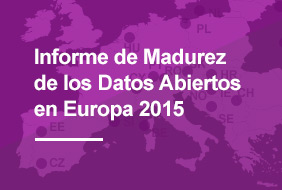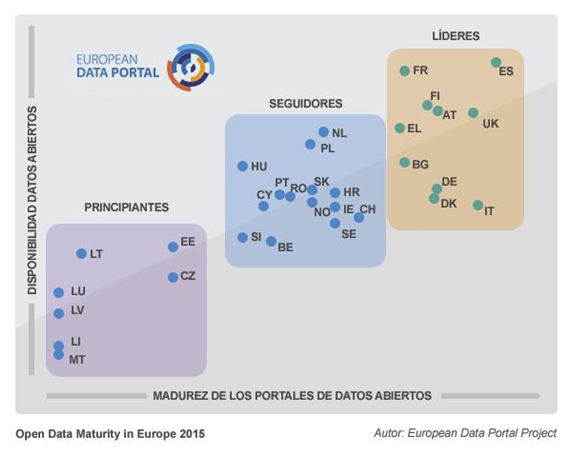Report: Open Data Maturity in Europe
Fecha de la noticia: 22-01-2016

As part of the European Data Portal Project, a new study has been published to assess the open data maturity status of the EU state members together with Liechtenstein, Norway and Switzerland (UE28+).
This anual report is intented to build a strong knowledge base, which helps create an European leaders network to delve into the national activities and identify those common aspects which require support and expert assistance.
To measure open data maturity of each country two key indicators have been selected, including several sub indicators. These metrics cover both the status quo of national policies promoting open data as well as an assessment of the features made available on national data portals. The first indicator, Open Data Readiness, looks at open data policies and steps taken to measure the socioeconomic impact of the reuse of public sector information.
The second indicator, Portal Maturity, measures the usability of web based open data portals with regard to the availability of functionalities, the overall re-usability of data, as well as the access to data from different industries.
According to the study, of the EU 28+ countries, 87% already has a national open data portal, with the exception of Latvia, Liechtenstein, Luxembourg and Malta. Moreover, almost two-thirds of the EU28+ countries have integrated a dedicated open data policy. Nevertheless, just 44% of them have achieved the full open data maturity. The report reveals that there are large discrepancies across countries, as only 32% of the nations are leading the way with solid policies and specific norms and promoting the national and local reuse of public sector information.
Looking at the spread of the overall scores, a ranking of European open data initiatives has been built. The EU28+ nations are classified depending on three different maturity levels:
- Beginners: the initial steps have been made, but countries still struggle with basics around availability and accessibility. Portal functionalities remain limited and there is a limited coverage in terms of data sets.
- Followers: basics are set and there are advanced features on the portal. However, the approach to the release of data remains limited.
- Leaders: the most advanced nations which have solid open data portals with elaborate functionalities and solid national and regional coordination mechanisms.
According to results of the report, seven of the EU28+ countries (25%) position at the lower ranges of the ranking, being considered as Beginners. Half of the countries, fourteen of them, are classified as Followers, and only ten countries (35%) are considered as Trend Setters.

As shown by the figure, Spain is considered one of the leaders as regards open data maturity thanks to the high score obtained in both indicators. The results of the study show that the national open data sector has reached a satisfactory level of maturity, and the nation can set an example for other countries which are working to improve their open data initiatives.
Finally, this report also includes a number of recommendations to help the different state members reach open data maturity, including the following suggestions:
- An open data strategy is needed as a basis for cooperation across public administrations and engaging further with potential re-users;
- Adding basic functionalities on a portal can increase user friendliness and stimulate re-use;
- Awareness among citizens and businesses around Open Data should be increased;
- Trainings should be offered to civil servants to increase understanding of Open Data;
- The development of national guidelines dealing with issues such as priority domains and frequency of data release can help support local initiatives;
- Measuring the success of an Open Data initiative can help identify benefits and room for improvement.











